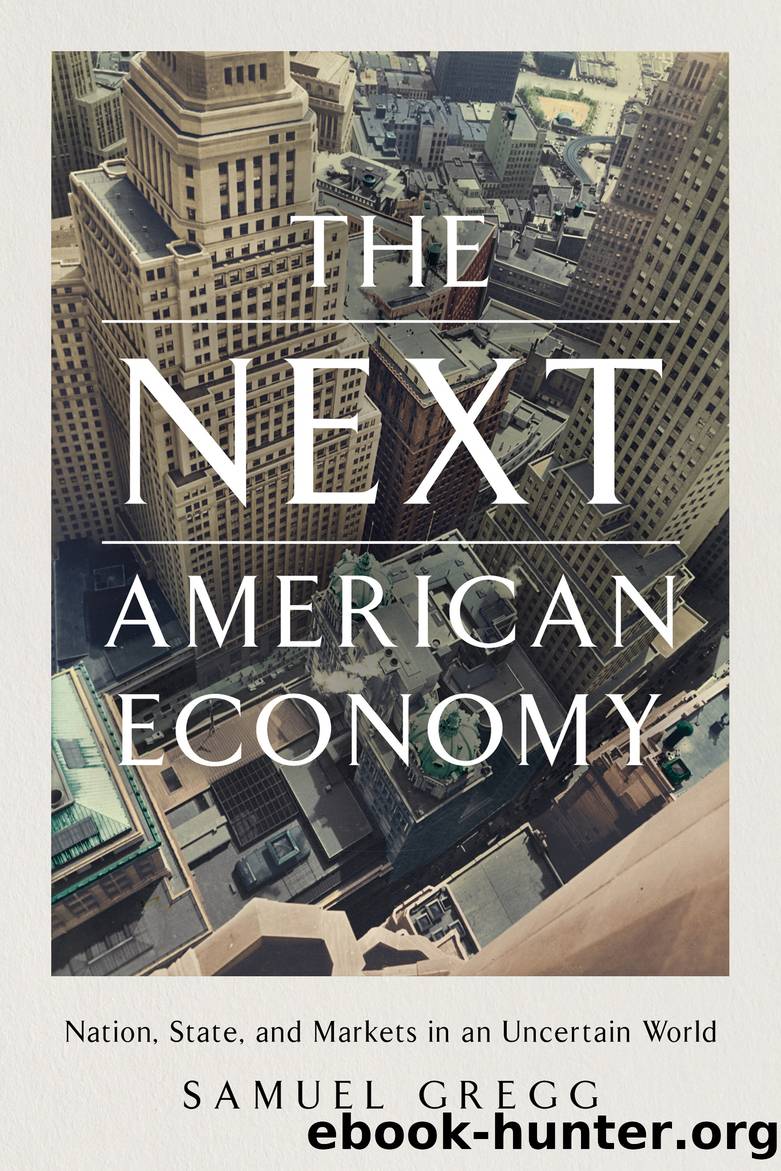The Next American Economy by Samuel Gregg

Author:Samuel Gregg
Language: eng
Format: epub
Publisher: Encounter Books
CHAPTER 6
COMPETITIVE NATION
In general, if any branch of trade, or any division of labor, be advantageous to the public, the freer and more general the competition, it will always be the more so.
âADAM SMITH
The competitive instinct is innate to humans. Whether we admit it or not, we constantly assess how we are doing in light of othersâ achievements. Everyone wonders how they are performing relative to their peers. Many societies are unenthusiastic about acknowledging these realities. America, however, is different.
Just as Americans have a reputation for entrepreneurship, they are also viewed as enthusiasts for competition. In the 1830s, Tocqueville commented on how âthe competition of allâ1 pervaded America, and the ways in which a competitive spirit expressed itself in every aspect of American life, ranging from religion to politics. That spirit, Tocqueville noted, distinguished the American republic from many European nations in which competition was often considered inimical to social cohesion, as something that challenged traditional hierarchies, and often as rather vulgar.
But how much is this American reputation for a full-throated embrace of competitiveness merited today? In Chapter Four, we identified corporatism and its guarded view of competition as part of the background influence upon the stakeholder capitalism that some want America to embrace. Edmund Phelps points out, however, that the American economy has already experienced several waves of corporatism, all of which have negatively impacted competition throughout America. One wave occurred in the 1930s, when unions acquired significantly more institutional power following the New Deal and then used it to diminish competitiveness in labor markets. Another upsurge ensued in the 1950s and 1960s, when many large modern American corporations grew close to the federal government as a consequence of Cold War military spending and used their position to inhibit competition in industries such as aircraft manufacturing. A third corporatist wave, Phelps states, began in the 1980s, as expansive stakeholder theory gained traction in universities and worked its way into corporate America.
But Phelps maintains that another form of corporatism began spreading throughout the U.S. economy in the late 1980s and early 1990s. According to Phelps,
The new corporatism ⦠goes beyond the groups of classical corporatismâthe groups that may bargain collectively and the groups yoked together in âconcerted actionââby embracing the idea of a social compact: every person in a society is a signatory to an implicit contract with the othersâits terms understood by allâand according to this contract, no person may be harmed by others without receiving compensation. ⦠This new element of corporatism goes beyond the classic demand for state control that improves the conditions of societyânational growth through state direction and industrial peace through âconcertationâ and co-determinationâto the demand that the course of development at no time set back some while propelling the rest. The new thinking sees the state as undertaking to protect everyone from everyone elseâor as close to it as is practicable.2
Download
This site does not store any files on its server. We only index and link to content provided by other sites. Please contact the content providers to delete copyright contents if any and email us, we'll remove relevant links or contents immediately.
Zero to IPO: Over $1 Trillion of Actionable Advice from the World's Most Successful Entrepreneurs by Frederic Kerrest(4501)
Machine Learning at Scale with H2O by Gregory Keys | David Whiting(4290)
Never by Ken Follett(3934)
Harry Potter and the Goblet Of Fire by J.K. Rowling(3844)
Ogilvy on Advertising by David Ogilvy(3598)
Shadow of Night by Deborah Harkness(3356)
The Man Who Died Twice by Richard Osman(3069)
Book of Life by Deborah Harkness(2929)
The Tipping Point by Malcolm Gladwell(2909)
Will by Will Smith(2904)
0041152001443424520 .pdf by Unknown(2843)
My Brilliant Friend by Elena Ferrante(2823)
Purple Hibiscus by Chimamanda Ngozi Adichie(2811)
How Proust Can Change Your Life by Alain De Botton(2801)
How to Pay Zero Taxes, 2018 by Jeff A. Schnepper(2643)
Hooked: A Dark, Contemporary Romance (Never After Series) by Emily McIntire(2544)
Rationality by Steven Pinker(2349)
Can't Hurt Me: Master Your Mind and Defy the Odds - Clean Edition by David Goggins(2319)
Borders by unknow(2301)
